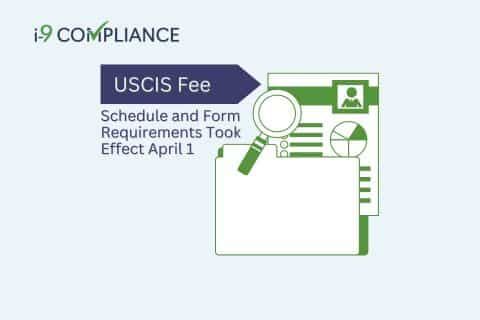USCIS Fee Schedule and Form Requirements Took Effect April 1

The U.S. Citizenship and Immigration Services (USCIS) has made significant changes recently. These changes include major fee increases and the introduction of new forms. Both went into effect on April 1, 2024, significantly impacting employment-based petitions.
The USCIS’s new fee rules raised the costs for many immigration applications, such as the employment-based categories. As such, many employers may see significant changes. However, a U.S. district court judge may choose to grant a request to enjoin the final rule. This potential decision is due to a recent lawsuit against the agencies’ rule-making.
The final rule will increase the filing fees for most immigration applications. One example includes the fiscal year H-1B petitions, which will increase filing fees from $460 to $780. In addition, the USCIS introduced an asylum program fee for employment-based filing. This fee costs an additional $600 for every filed Petition for a Nonimmigrant Worker (Form I-129) and Immigrant Petition for Alien Workers (Form I-140).
A reduction in these fees could benefit small employers, including those with 25 or fewer employees and nonprofit organizations. One example is the asylum fee. The final rule would reduce this from $600 to $300 for small employers and remove it for nonprofit employers. In an additional final rule, the USCIS recently clarified that the definition includes “not-for-profit primary or secondary educational institutions, or institutions of higher education.”
In response to these changes to fees, USCIS also made necessary changes to certain forms, including:
- “Form I-129, Petition for a Nonimmigrant Worker;
- Form I-129 CW, Petition for a CNMI-Only Nonimmigrant Transitional Worker;
- Form I-140, Immigrant Petition for Alien Workers;
- Form I-600, Petition to Classify Orphan as an Immediate Relative; and
- Form I-600A, Application for Advance Processing of an Orphan Petition, and the form’s supplements.”
Ordinarily, the agency would give employers a grace period after introducing a new form before requiring its use. However, because the USCIS judged the changes necessary to administer the new fees, it will require the use of these forms when the new fee schedule goes into effect. As of April 1, 2024, the USCIS will only accept the 04/01/2024 edition of the above forms.
Employers should ensure compliance with these changes. Another area of compliance employers should maintain is the employment eligibility verification (Form I-9) process. One way to do this is by using an electronic management tool with an E-Verify integration option. This system can guide HR personnel through every step of employment eligibility verification, ensure seamless digital storage of forms and documentation, and alert users when they must take further action.
Automate your employment eligibility verification today with the ensured compliance of I-9 Compliance.